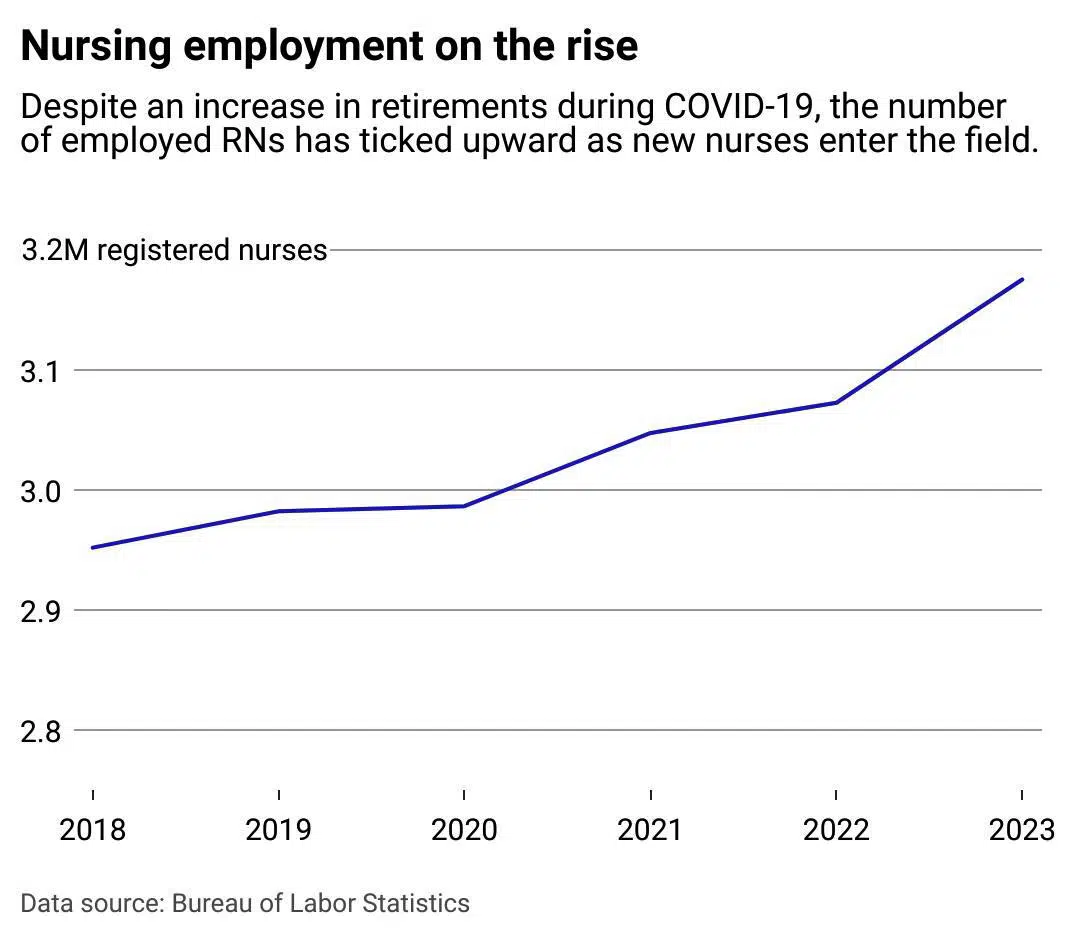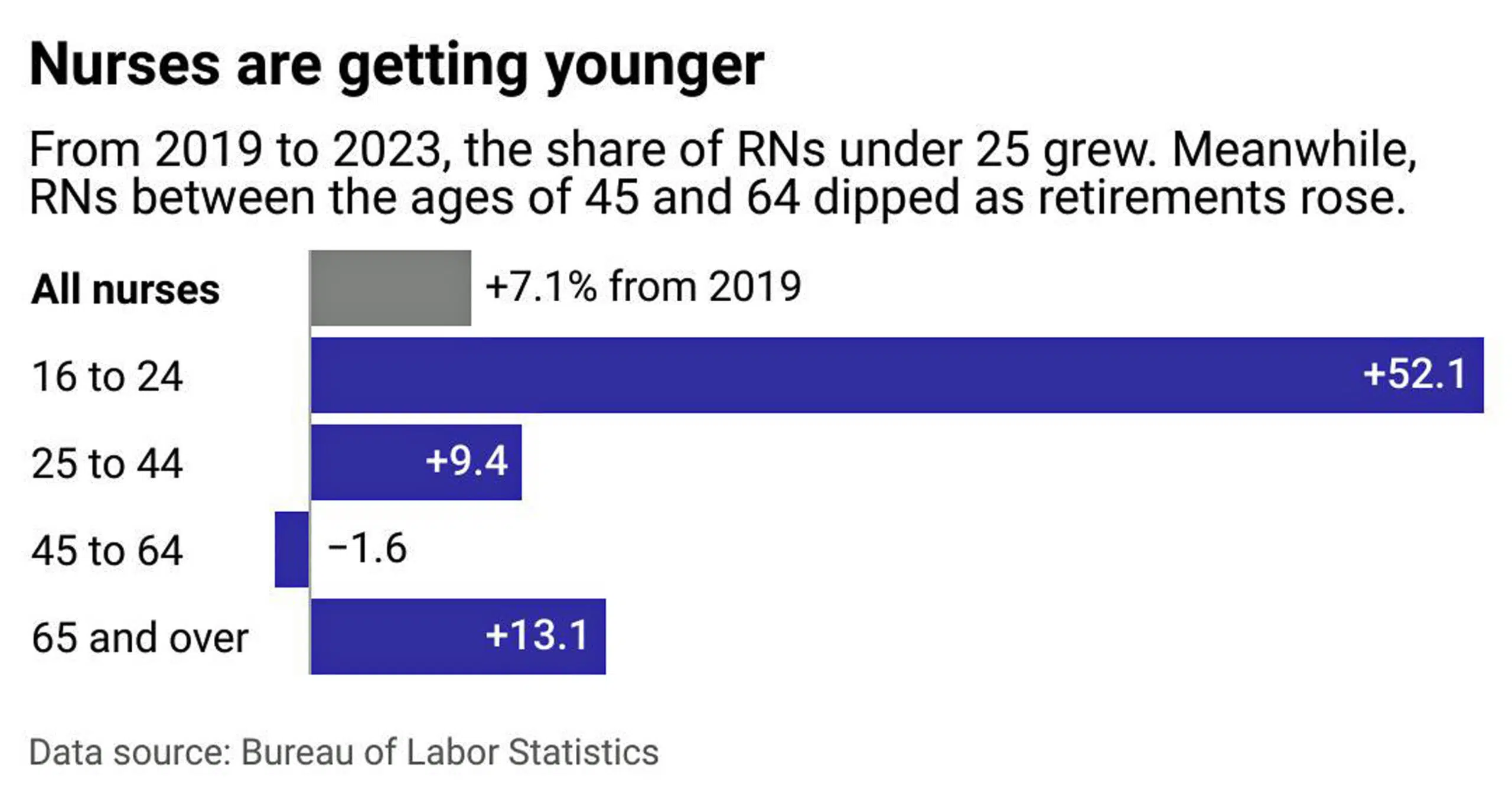The nursing industry lost at least 130,000 nurses between 2020 and 2022 as the COVID-19 pandemic demanded more working hours, causing an emotional drain, according to the 2022 National Nursing Workforce Study. However, that exodus was partially offset by new nurses entering the field, many of whom were inspired by the pandemic to effect positive change.
With the continued rise of burnout and fewer mentors in the workplace, government agencies—along with private companies and nonprofits—have been investing millions in recruiting and retaining experienced employees in the nursing industry.
Vivian Health used data from the Bureau of Labor Statistics and the most recent National Nursing Workforce Study to examine how widespread nurse retirement is shaping the nursing industry. The data also illustrates how demographics have changed in the last five years.

More Nurses Are Entering the Field
A shortage of nurses could have dire implications for patients, including increased readmission rates, staffing shortages and higher morbidity rates. However, despite chatter about nurse scarcity, the number of registered nurses in the workforce has increased steadily over the past five years, according to data from the Department of Labor.
Widespread retirements have impacted some sectors more than others. A March 2024 survey from the American Health Care Association found that 99% of nursing homes have open positions; among those, about 9 in 10 seek to hire for registered nursing roles. What’s more, three-quarters say their workforce is down from pre-pandemic levels.
Demand for nurses is only expected to grow over the next decade as Americans grow older and need long-term care.
The Health Department estimates a shortage of 63,720 full-time nurses in 2030. However, as more nurses graduate and enter the workforce, the department projects an oversupply of registered nurses by 2035.

Share of Young Nurses on the Rise
While some new nurses are older and enter the field through a career change, overall, nurses have become younger. According to the National Nursing Workforce Study, the median age of registered nurses was 46 in 2022, falling from 52 in 2020. Younger nurses also make up a larger share of the workforce. The portion of registered nurses younger than 29 grew, while the share of nurses older than 55 shrank from about two out of five nurses of the workforce to less than a third.
In the last five years, the number of nurses under 25 has grown seven times faster than nurses in other age groups. While most hospitals and schools require nurses or prospective students to be at least 18, some programs allow high school students to participate in vocational training.
This shift is making the industry more diverse and tech-savvy but comes with a new set of challenges. Younger nurses, like Millennials and Gen Z workers, are more likely to prioritize work-life balance and flexibility, according to a 2023 study in BMC Nursing. However, they also say they don’t feel respected or valued.
RELATED: Insights from Our 2024 Survey of Healthcare Professionals
The Need for Boosted Engagement
As the industry shifts focus to collaborative care, nurses play a key role in improving health care quality and managing chronic conditions. However, a comparative study published in the journal Policy Politics & Nursing Practice found that almost 1 in 5 registered nurses left the field after their first year, meaning those entering the profession need leadership support. With the lack of institutional knowledge gained through mentorship, continuing education is important to convey best practices and keep up with technological advances.
To retain experienced nurses, hospitals and other employers are adjusting their approach to increase employee engagement, which has been shown to correlate with improved performance among nurses across healthcare settings. Boosting engagement includes establishing clear paths for career growth and creating a climate for collaboration and appreciation.
Learn whether you’re getting paid what you deserve by comparing your salary to the average nurse salary in your location.
Story editing by Alizah Salario. Additional editing by Kelly Glass. Copy editing by Janina Lawrence. Photo selection by Clarese Moller.









